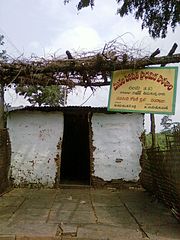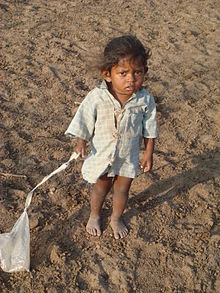- Chenchu people
-
The Chenchus are an aboriginal tribe of the central hill regions of Andhra Pradesh, India. Their traditional way of life has been based on hunting and gathering. The Chenchus speak the Chenchu language, a member of the Telegu branch of the Dravidian language family. In general, the Chenchu relationship to non-tribal people has been largely symbiotic. Some Chenchus have continued to specialize in collecting forest products for sale to non-tribal people. Sizable number of Chenchus live in the dense Nalamala forest of Andhra Pradesh.
Although the government provide funds for their development,schooling etc,it hardly percolates down to the real beneficiary.
The Chenchus are referred to as one of the Primitive Tribal Groups that are still dependent on forests and do not cultivate land but hunt for a living. Caste Hindus living among them, rent land from the Chenchus and pay a portion of the harvest. Dalits also settled among them with the help of the Chenchus and learned agriculture from them, and the nomadic Banjara herders who graze their cattle in the forest also have been allotted land there. The Chenchus have responded unenthusiastically to government efforts to induce them to take up farming themselves.
See also
- Chenchu Lakshmi, 1958 Telugu film.
- Christoph von Fürer-Haimendorf
This article includes material from the public domain Library of Congress Country Study on India.
External links
- CEPCE India
- Sathya Mohan (streamed video). Children of the Forest — India (Documentary). Journeyman Pictures. http://www.youtube.com/watch?v=-6IZzWSMJTU.
- The Chenchus A photo essay
Scheduled tribes of India Asur · Baiga · Bharia · Bhil · Bhumij · Bhutia · Birhor · Bodo · Bodo-Kachari · Boksa · Bonda · Chakma · Chenchu · Dimasa · Garo · Gondi · Hmar · Ho · Karbi · Khasi · Khonds · Kol · Korwa · Kuki · Lepcha · Lodha · Mahli · Mara · Mech · Mishing · Mizo · Mog · Munda · Mudugar · Naga · Oraon · Rabari · Rabha · Reang · Santals · Sora · Tripuri
File:Chenchu.jpg
Categories:- Social groups of India
- Telugu society
- Indigenous peoples of South Asia
- Hunter-gatherers
- Social groups of Andhra Pradesh
- Social groups in Orissa
- Indian ethnic group stubs
Wikimedia Foundation. 2010.


